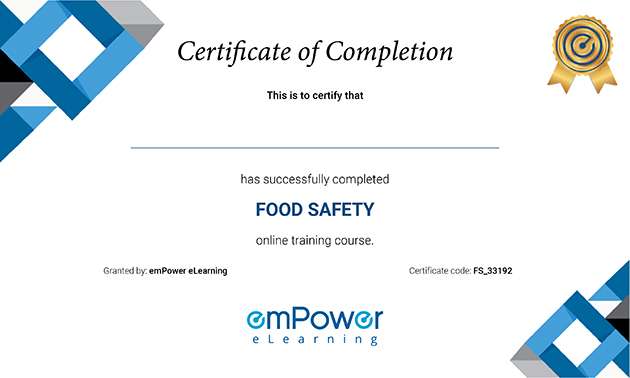Complete food safety manager certification Training & Course
Certify Your Expertise: Earn Food Safety Manager training certificate. Lead with Confidence in the F&B Industry!

Our Client

































What is Food Manager Training
The food manager training will provide you with the knowledge and skills that you require to run a food establishment safely. This training should be considered essential by people who are aiming for food safety manager certification. Food safety is a critical topic in the food and hospitality industry. Ignoring food safety can have a deadly impact on customers and impact your business massively.
As you go through this training, you’ll learn about the major illnesses that are transmittable through food. We’ll also help you understand the connection between foodborne diseases and maintaining personal hygiene.
As a manager, you’ll also be responsible for preventing transmission of bacteria and viruses by employees who have caught a disease or are suffering from a medical condition.
We’ll also cover PHFs or TCS foods, the value of time-temperature control. And lastly, we’ll cover the topic of the HACCP, and everything you need to know about it. If you are trying to get food safety manager certification, you need to know about all these topics. Our curriculum covers everything that you need to know for your certification.
Course Description
| Category | Food Safety |
| Course Name | Food Manager |
| Duration | 30 mins |
| Certificate Included | Yes |
| Languages | English |
| Course Type | Interactive online training |
| Narration | Yes |
| Format | LM-light, SCORM 1.2 |
| Supported Devices | Desktop/Laptop, Tablet, Phone |
| Last Updated | June 30, 2021 |
What you’ll learn
- Major illnesses that are transmissible through FOOD.
- Relationship between the prevention of foodborne disease and personal hygiene of your staff.
- It is your responsibility in preventing the transmission of foodborne disease by employees who have caught a disease or medical condition that may cause foodborne illness.
- Value of time-temperature control of PHFs/TCS foods.
- Time-temperature control parameters for all stages of food preparation.
- The HACCP plan.
- Correct procedures for cleaning and sanitizing.
Curriculum
- Why do you need to provide Safe Food?
- What is Contamination?
- Forms of Contamination
- Food safety and Bacteria
- FAT TOM
- Food safety and Viruses
- Food safety and Parasites
- Food safety and Fungi
- What are Food Allergens?
- How to respond to a Foodborne-illness Outbreak?
- What is A.L.E.R.T.?
- Employee Health and Hygiene
- The Big Five in food safety
- What are reportable symptoms?
- Why are exclusion and restriction so important?
- What is Personal Hygiene?
- Why Handwashing is so important?
- Using Gloves
- Other hygiene rules
- Dangers of bare hand contact
- Guidelines for servers
- How to care for wounds
- What is Proper Food Handling?
- What is Cross Contamination?
- Preventing Time-Temperature Abuse
- Monitoring Time and Temperature
- Purchasing and Receiving supplies
- Accepting and Rejecting food Deliveries
- How to handle recalls
- Food Storage essentials
- The Basic Sequence of Food Preparation
- Proper Food Preparation
- What is Freezing?
- What is Thawing?
- What is Refrigeration?
- What is Food Preparation?
- What is Cooking?
- What is Hot and Cold Holding?
- What is Cooling?
- How to Cool Food Safely?
- Rules of Reheating food?
- Rules of Serving Food
- Rules of Re-serving Food
- Rules of Self Service arrangements
- Food safety at Off-Site Service
- What is a Food Safety Management System?
- What is Active Managerial Control?
- Elements of an effective food management system
- HACCP – Hazard Analysis Critical Control Point
- The 7 Principles of HACCP
- How to develop a HACCP Plan?
- Facility and Equipment
- What do you mean by Food contact surfaces?
- Learn about food facility design
- Learn about equipments
- What is Pest management
- Cleaning and Sanitizing
- How to use Detergents?
- Types of Sanitizers
- The Process of Cleaning and Sanitizing
- Sanitizing your food facility
Who Should Attend?
- Restaurant, produce, and convenience store managers.
- Owners and managers of food service establishments
Why emPower
100s of customers
- 14+ Years of experience in working with small to large businesses from different industries
- 95% customer retention
Customer Experience
- 24x7 dedicated support and toll free number
- 99%+ guaranteed uptime
Extremely Cost-effective
- As low as $0.99/user/yr
- We will match or better the price of your current LMS
Effective Courses
- Each course is 20-40 min long to ensure engagement with quizzes and certificate
- SCORM 1.2 Compliant
Implementation
- No setup costs
- We deploy your customized solution in less than 48 hours
Our Achievements
Here you can review some statistics about our Education Center
Start Your Certification Course Today
Even if it’s not required by state law, each establishment should have a person with food manager training. This is because foodborne illnesses can be deadly. You need to have a manager who understands HACCP guidelines.
Over emPower, you can purchase the Food Manager Online Training at $39.99. Upon completion, you’ll be awarded a completion certificate. This would remain stored over your learning portal for the entire year.
To get certified, you must pass a written exam. The certification exam should be approved by ANSI, ANAB, or CFP. You can also take the food manager certification exam approved by your state’s department of health.
The validity of your certification depends upon the state you are in. For instance, the NYC food certificates never expire. While in Texas and California, the certification is valid for 5 years.

